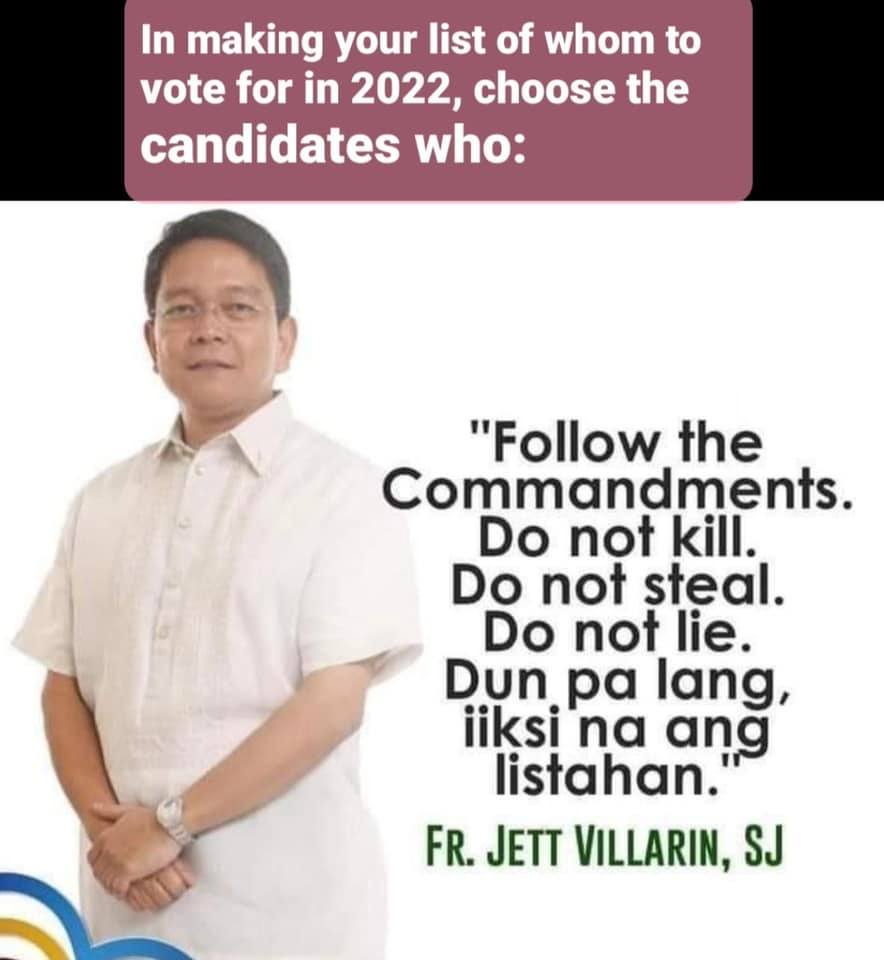248 total views
Homily for Wednesday of the 33rd Week in OT, 17 November 2021, Luke 19:11-28
The Filipino Jesuit scientist, Fr. Jett Villarin, former president of the Ateneo de Manila, gave a very simple advice on the coming elections in May. He said in his post, “Follow the commandments. Do not kill. Do not steal. Do not lie. Du’n pa lang, iiksi na ang listahan. (With just these principles, you can trim down the list already.)”
I think today’s Gospel will agree with Fr. Jett. This Gospel parable which we know better as the PARABLE OF THE TALENTS, is also called a Parable about Responsible Stewardship (Pagiging Mabuting Katiwala). What is most unique about the way St. Luke tells the story is, he turns it into a parable about POLITICAL STEWARDSHIP. It is not just about the question of knowing whom to entrust material resources to. That is how it is presented by Matthew in his version of this parable.
Here in St. Luke, the real issue is knowing to whom we should entrust leadership for GOVERNANCE. This is probably one of the most political parables in all four Gospels of the New Testament. Luke tells us the good candidate for kingship was not immediately accepted at the start. Perhaps in today’s political context, they’d say he was not doing well in the surveys at the outset. But that did not stop him from eventually obtaining the kingship, nevertheless.
His political strategy was different. He knew that governance was not a matter of lording it over people. He knew how to find the right co-workers in governance. It was not a matter of powerplay for him; it was rather a matter of finding the people who could be entrusted with authority in the spirit of servanthood, and who would not abuse it. And so he tested ten stewards by entrusting ten gold coins to them—meaning one gold coin for each.
In Matthew, the reward of the trustworthy stewards was also money. Here in St. Luke, the reward is political stewardship. Upon the king’s return, and after receiving a report, he trims down his list from ten to three. (I suppose the other seven had not had any success. They probably had lost in business.) The master tells the first two of the three, “Because you have been faithful in this very small matter; I will put you in charge of several cities.” But as regards the third steward who did not lose the money but did not use it at all, not only does the master exclude him from his list of stewards, he also takes away the gold coin that he had kept and gives it to the first.
Fr. Jett was right. If the criteria are clear and obvious, the list can easily be trimmed down. But then of course, what is obvious for some is not so obvious for others—especially for the killers, the thieves, the liars and their enablers and supporters. They can even control public opinion and get people to reject the good candidates or perhaps even crucify them in Jerusalem like they did with Jesus.
Thank God, the parable has a happy ending—there is a day of reckoning for those who reject those who represent the principled leadership or stewardship of God’s Kingdom. The Lord gives them a dose of their own medicine. He will make them fall on their own weight and end up as victims of the cruelty and violence that they inflict on others.
And so the master in the parable says, “The one who has, will be given more.” Meaning, the one whom the Lord has tested and proven to be trustworthy with a few responsibilities will be entrusted with greater responsibilities. The ones who have none, meaning, no principles, no sense of accountability, no qualms of conscience—these are the ones who will end up losing whatever little influence they used to have.
I hope you take a little more time reflecting on this political parable. I hope it is able to help you trim down the names of people in your personal, family, community lists of prospective candidates for the local or national elections. We should never again neglect politics as an essential component of nation-building and working for the common good. We should in fact be ashamed to call ourselves Christians if we don’t actively participate in getting the trustworthy candidates voted into office. That is, if we care at all about the future of our country.
It is not enough to pray for good candidates, which, of course, is also important. The Lord has given us those candidates already. Unfortunately, the Lord is not a voter in the coming elections. We are. He has entrusted to us the task of making that important choice. Will we or will we not respond to his call to be responsible stewards of our nation which he loves so dearly, and has saved many times already from destruction? The old song by Peter, Paul and Mary says it very figuratively. “The answer is blowing in the wind.” That wind for us Christians is the Holy Spirit. May he truly blow a refreshing wind on our country in the months to come
















